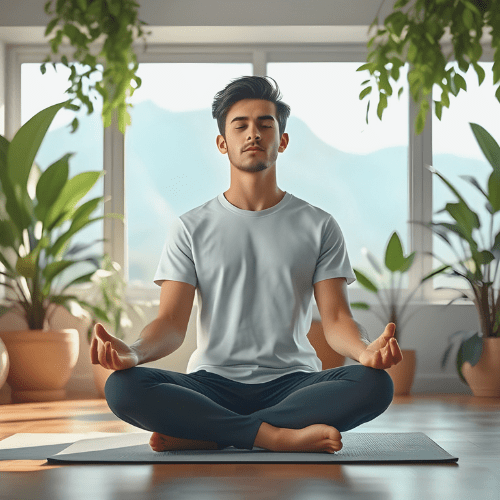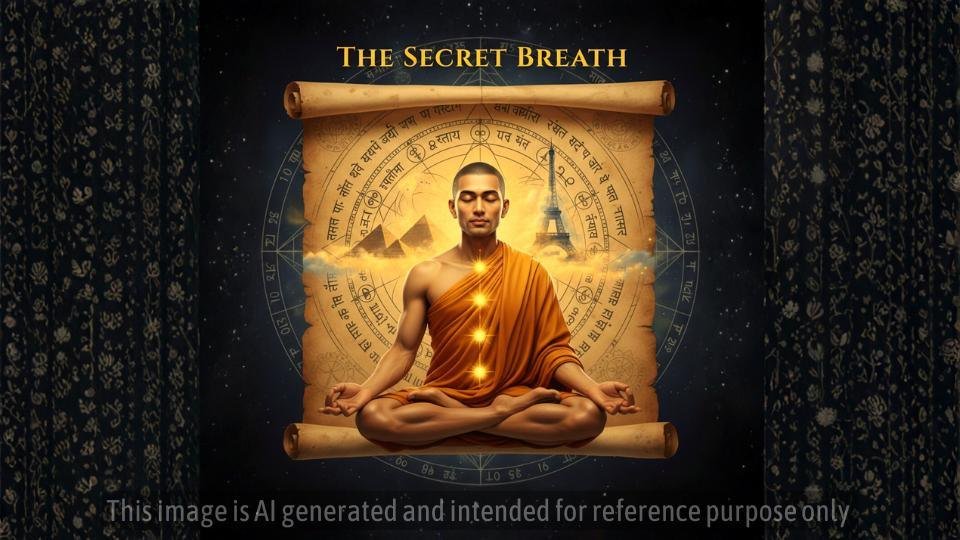कृपया इसे हिंदी में पढ़ने के लिए यहाँ क्लिक करें
In today’s fast-paced world, we often focus heavily on maintaining our physical health—exercising, eating well, and taking care of our bodies. However, just as important as our physical health is our mental health. In fact, taking care of your mental health can be just as beneficial as working out at the gym. One of the best ways to do this is through meditation.
You might wonder, how does meditation help our mental health? Well, meditation is a simple yet powerful practice that calms the mind, reduces stress, and improves overall well-being. And just like physical fitness, meditation can become a part of your daily routine, offering numerous benefits.
Why Meditation is equally important as maintaining physical health?
We take time to exercise our muscles and keep our bodies in shape, but what about our minds? Just like muscles need exercise to stay strong, our minds need regular practice to stay sharp, calm, and healthy. Meditation is one of the best tools to keep our minds fit.
By meditating, you’re engaging in a form of mental exercise that helps you become more mindful, reduces anxiety, and even improves your emotional balance. The best part? It doesn’t require much time or effort to get started—just 10 minutes a day is all it takes to begin and you can increase the duration as you wish.
Surprising Benefits of Meditation
- Reduces Stress: Meditation is known for its ability to calm the mind and body, helping to alleviate stress.
- Improves Focus and Concentration: Regular meditation increases your attention span and sharpens your concentration, making it easier to stay focused throughout the day.
- Promotes Emotional Health: Meditation has been shown to help manage anxiety, depression, and negative emotions, contributing to a more positive outlook on life.
- Boosts Self-Awareness: It allows you to develop a deeper understanding of yourself, fostering personal growth and self-improvement.
- Enhances Creativity: Meditation encourages your mind to think freely and think creatively, leading to more innovative ideas.
- Improves Sleep: If you struggle with insomnia or restless nights, meditation helps calm the mind, making it easier to fall asleep and enjoy deeper, more restful sleep.
- Strengthens the Immune System: By reducing stress, meditation boosts your immune system, making it easier to fight off illnesses.
- Increases Patience: As meditation helps you develop mindfulness, it naturally increases your level of patience in daily life.
- Helps Control Pain: Meditation has been shown to reduce the perception of pain, helping to manage chronic pain more effectively.
- Boosts Happiness: Regular meditation increases the production of serotonin, the “feel-good” hormone, enhancing your mood and overall sense of well-being.
- Improves Relationships: Meditation helps you become more empathetic and compassionate, fostering better relationships with those around you.
- Balances Emotions: Meditation promotes emotional regulation, helping you respond to life’s challenges with calm and clarity.
Different Ways to Meditate
If you’re new to meditation or looking for new techniques to try, there are various ways to meditate. You can start with whichever method feels most comfortable for you. Here are 6 different ways to meditate:
1. Mindful Meditation (Silent Meditation)
Sit in a quiet space, close your eyes, and focus on your breath. Pay attention to how your body feels with each inhale and exhale. The goal here is to clear your mind of distractions and bring your awareness to the present moment. Start with 5 to 10 minutes and gradually increase the duration as you feel more comfortable.
2. Guided Meditation
If you find it difficult to meditate on your own, guided meditation can be a great option. There are numerous guided meditation videos and apps available that walk you through the process. A voice guides you in visualizations, breathing exercises, or relaxing affirmations to help you relax and focus.
3. Chanting Mantras
Chanting mantras involves repeating a word or phrase (like “Om” or the name of a God you worship) softly or in your mind. This practice can help center your thoughts and bring a sense of peace. You can also choose a mantra that resonates with you personally for a more spiritual experience.
4. Music Meditation
Listening to calming music or nature sounds can also help you achieve a meditative state. The soothing sounds allow you to let go of mental clutter, relax, and focus on the present moment. Find music that you enjoy and let it guide you into a peaceful meditation session.
5. Walking Meditation
If sitting still feels challenging, try walking meditation. Simply walk slowly in a quiet space, focusing on each step. Pay attention to how your feet feel as they touch the ground and the rhythm of your movements. Walking meditation is a great option for those who prefer movement over stillness.
6. Loving-Kindness Meditation (Metta Meditation)
This meditation practice involves focusing on sending out feelings of love and kindness towards yourself and others. You silently repeat phrases like “May I be happy, may all my friends, family and even strangers be healthy”. It’s a beautiful practice for cultivating compassion and empathy.
How to Get Started with Meditation
Starting with meditation is easier than you think! You don’t need any special equipment, just a quiet space and a few minutes of your day. Here are some simple steps to begin your practice:
- Set a Time: Pick a specific time each day to meditate, even if it’s just 10 minutes. Consistency is key.
- Find a Quiet Place: Whether it’s a quiet room, a park, or even your bed, find a space where you can sit comfortably without distractions.
- Choose Your Method: Start with any of the methods above and experiment with what feels right for you.
- Focus on Your Breathing: Pay attention to your breath, and when your mind wanders, gently bring your focus back to your breath or mantra.
- Be Patient: Like any new habit, meditation takes time. Don’t expect immediate results, but with practice, you’ll begin to notice the positive effects.
Conclusion
Meditation is not just a way to relax—it’s a powerful tool for maintaining your mental health and achieving a balanced, peaceful mind. Just as we prioritize physical fitness, we should make time for mental fitness, and meditation offers the perfect solution. Whether you practice mindful meditation, chant a mantra, or listen to calming music, the benefits of meditation are endless.
So, take a moment today to pause, breathe, and meditate. Your mind will thank you for it!







Leave a Reply